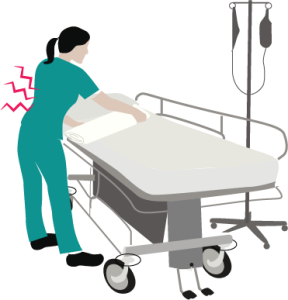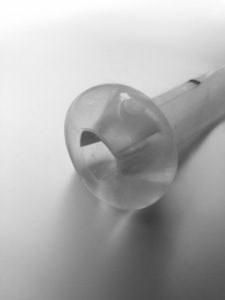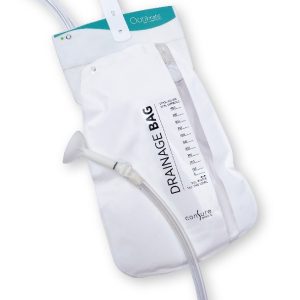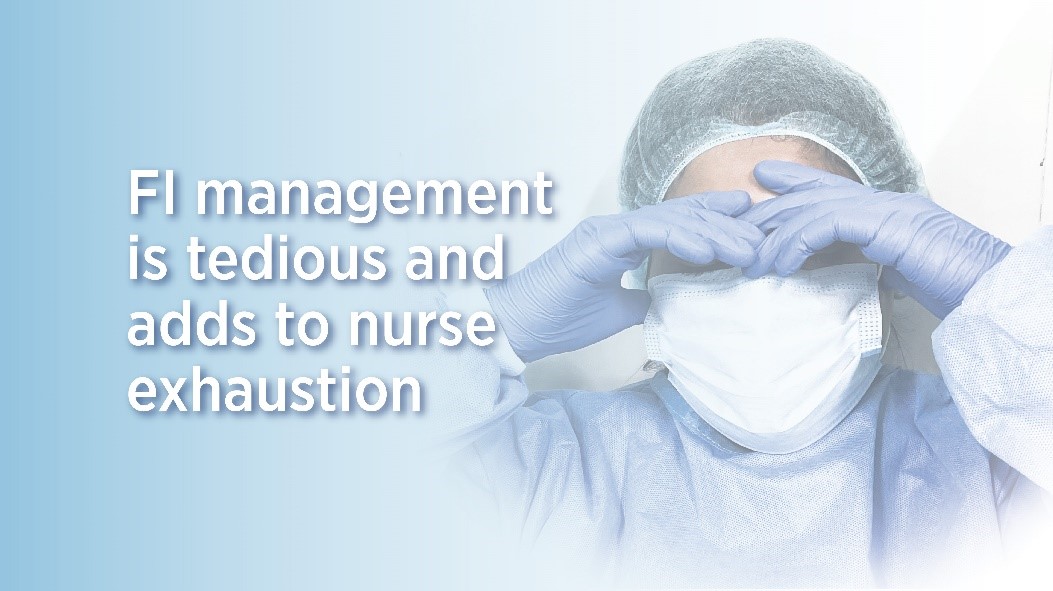ICU nurses have exceptionally challenging jobs. Performing lifesaving care is exhausting, both physically and mentally, and is extremely time-consuming. Providing basic care also takes time, energy, and mental acuity. The intense nature of nursing, especially in the ICU, leads to nurse exhaustion and burnout.
Nurse burnout is a serious issue for hospitals, ICU nurses, and patients. Even before COVID-19, two-thirds of nurses experienced burnout. The pandemic made burnout worse: nearly half of all nurses responding to a JAMA survey reported burnout and 40 percent said they’d leave their jobs if they could. Burnout is especially prevalent among ICU personnel, ranging as high as 47 percent.
Fecal Incontinence in Patients Contributes to Nurse Burnout

Nurses experience back pain due to rigorous turning and repositioning of patients
Fecal incontinence management in ICU presents special challenges for nurses. Critical conditions and the medications used in the ICU can cause fecal incontinence. Inadequate management of fecal effluents are a source for various clinical complications such as incontinence-associated dermatitis (IASD), pressure ulcers (HAPI), cross-contamination, which require nursing intervention. To avoid these complications, managing fecal incontinence is an essential part of ICU nursing care.
Nursing intervention for fecal incontinence often involves the use of absorbent pads. Absorbent pads merely protect bed linens and patients are constantly exposed to fecal matter. Prolonged fecal exposure can cause IAD, HAPI, and degrade hospital quality metrics. To maintain patient hygiene and to avoid complications nurses have to perform frequent changes of absorbent pads. These changes involve a couple of tasks such as wearing a clean gown, lifting-and repositioning patient to clean their sacrum, changing the bedding which involves 174 minutes of nursing time. Patients may require this care several times each shift; in many cases, two or more nurses are required to reposition and change linens and underpads. More than 38% nurses experience lower back pain associated with turning and repositioning patients. 12% of all the nurses intending to quit nursing permanently cited backpain as main or contributing factor.

IBCs take up to 60 mins of nursing time
Many institutions are turning to a fecal management system (FMS) to manage incontinence. Current systems commonly known as intrarectal balloon catheters (IBCs) feature a rectal tube, fecal collection bag, and retention balloon. While a fecal incontinence device can effectively contain stool, IBCs require rigorous irrigation and milking for adequate fecal diversion. Variances in balloon catheter induction, such as over-inflating the balloon, can cause leakage that results in even more work for nursing staff. High intrarectal pressures (above of 30 cm of water) result in an ‘urge to defecate’ sensation, which triggers the natural bowel movement physiology. Higher incidences of leakage lead to cross contamination which cause increased susceptibility towards HACs and other severe complications that impacts patient’s hospital stay. Maintenance of fecal incontinent patients with high pressure balloon catheters take up to 60 minutes of daily nursing time.
Qoramatic Helps Reduce Nurse Burnout
Qoramatic can help reduce the tedium and workload that causes exhaustion and burnout in the ICU.

Qoramatic : First ever Automated Stool Management System
The Qoramatic Automated Stool management kit is designed to provide a safe and effective fecal management solution and to help enhance the quality of care. Qoramatic proactively diverts the fecal effluents using negative suction pressure reducing incidences of leakage, hospital acquired complications (HAC and HAI) and decreases the need for frequent (and exhausting) repositioning and lifting of patients. By automating fecal incontinence management, nursing time required for patient care can be reduced by up to 98%. Milking and irrigation are automated, reducing the nursing burden and adding to the comfort of the patient. The device includes intelligent LED indicators, for ease of use and at-a-glance information any given time. This further reduces the nursing burden and provides faster and more efficient patient care. Automating manual patient care tasks such as fecal incontinence management can alleviate physical burden and can potentially reduce burnout.
To learn more about Qoramatic, drop an email to [email protected].


